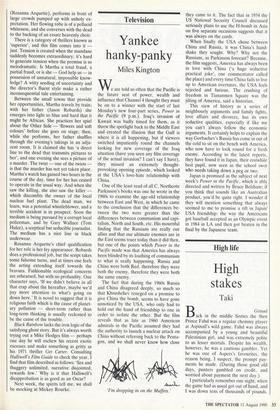Television
Yankee hanky-panky
Miles Kington
We are told so often that the Pacific is the future seat of power, wealth and
influence that Channel 4 thought they must be on to a winner with the start of last Monday's new four-part series, Power in the Pacific (9 p.m.). Iraq's invasion of Kuwait was badly timed for them, as it threw the spotlight back to the Middle East and created the illusion that the Gulf is where it is all happening, but if viewers switched impatiently round the channels looking for new coverage of the Iraq situation (have you seen any film coverage of the actual invasion? I can't say I have), they missed an extremely thought- provoking opening episode, which looked at the USA's love-hate relationship with China.
One of the least read of all C. Northcote Parkinson's books was one he wrote in the 1960s to examine the age-old relationship between East and West, in which he came to the conclusion that the differences be- tween the two were greater than the differences between communism and capi- talism, North and South, etc. His mournful finding that the Russians are really our allies and that our ultimate enemies are in the East seems truer today than it did then, but one of the points which Power in the Pacific made was that America has always been blinded by its loathing of communism to what is really happening. Russia and China were both Red, therefore they were both the enemy, therefore they were both the same enemy.
The fact that during the 1960s Russia and China disagreed deeply, so much so that Khrushchev reneged on a promise to give China the bomb, seems to have gone unnoticed by the USA, who only had to hold out the hand of friendship to one in order to isolate the other. But the film reveals that as late as 1960 American admirals in the Pacific assumed they had the authority to launch a nuclear attack on China without referring back to the Penta- gon, and we shall never know how close 'I'm dropping in on the Muffets.' they came to it. The fact that in 1954 the US National Security Council discussed seriously plans to use the H-bomb in Asia on five separate occasions suggests that it was always on the cards.
When finally the USA chose between China and Russia, it was China's hand- shake they sought. Why? Why not the Russians, as Parkinson forecast? Because, the film suggests, America has always been in love with China ('a huge seductive practical joke', one commentator called the place) and every time China fails to live up to American overtures, the USA feels rejected and furious. The crushing of freedom in Tiananmen Square was the jilting of America, said a historian.
This view of history as a series of neighbourly arguments and family fights, love affairs and divorces, has its own seductive qualities, especially if like me you can't always follow the economic arguments. It certainly helps to explain the way Gorbachev's Russia has come in out of the cold to sit on the bench with America, who now have to look round for a fresh enemy. According to the latest reports, they have found it in Japan, their erstwhile best pupil, now seen as the school swot who needs taking down a peg or two.
Japan is promised as the subject of next week's Power in the Pacific, which is ably directed and written by Bruce Belsham; if you think that sounds like an Australian product, you'd be quite right. I wonder if they will mention something that always seemed to me to promise a rift in Japan/ USA friendship: the way the Americans got baseball accepted as an Olympic event in 1984 in LA and then got beaten in the final by the Japanese team.










































 Previous page
Previous page